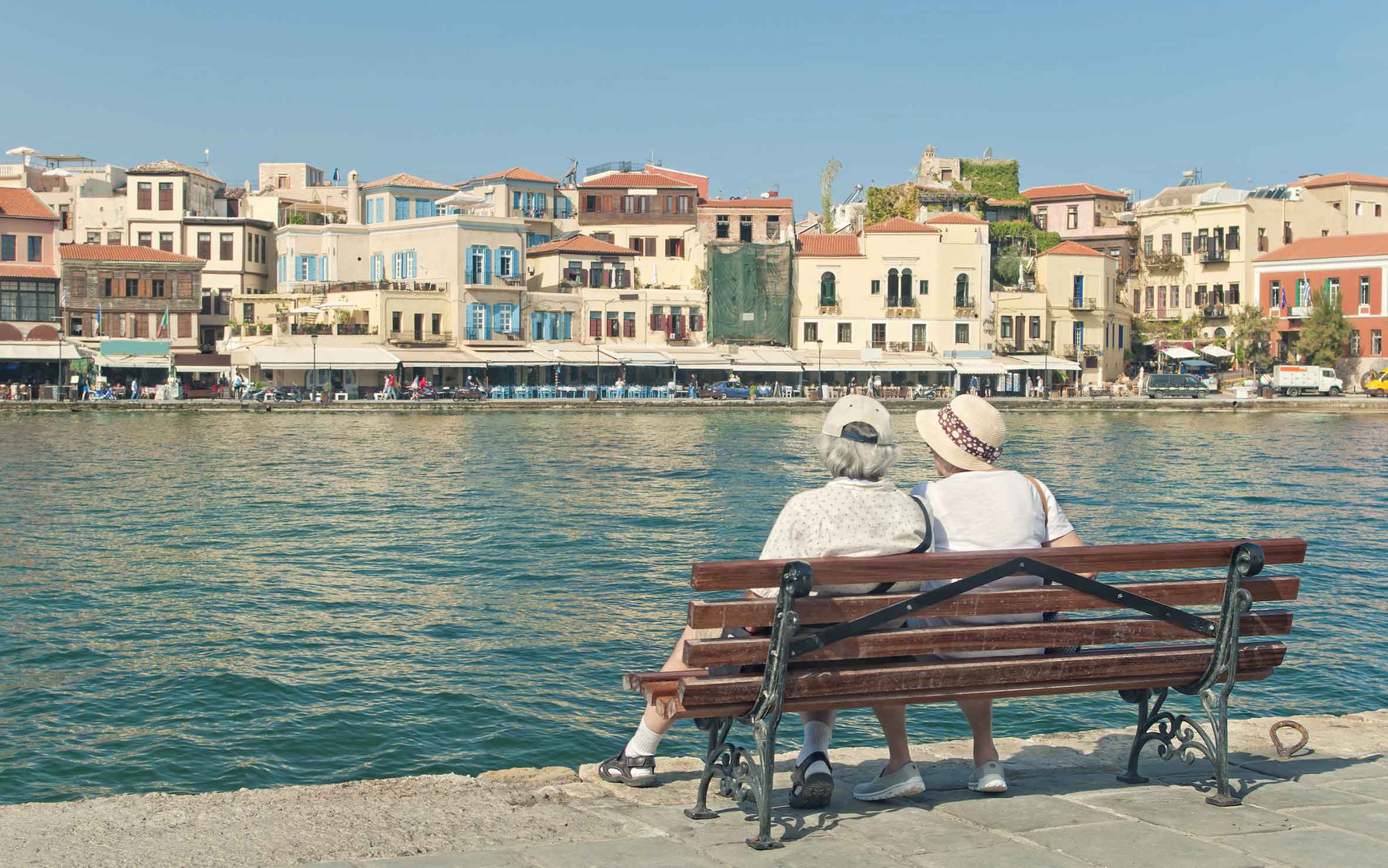As the cost of living crisis continues to bite, many soon-to-be retirees are looking for more affordable places to relocate and spend their autumn years. In recent months, Greek tourism minister Vasilis Kikilias has been pulling out the stops to woo pensioners, especially from northern Europe, to fly south and retire in Greece, a country that offers year-round sunshine, a relaxed, laidback way of life, beneficial tax incentives, and much, much more.
The so-called “silver economy” – products and services tailored to older people and retirees (e.g., healthcare and “age-friendly” tourism) – has enormous growth potential in a country like Greece. In fact, countries across southern Europe are scrambling to tap into the continent’s FOUR TRILLION-euro silver economy, which is only set to rise in the years ahead. While many might baulk at the thought of Greece being transformed into the “Florida of Europe,” government strategists predict that it could boost the economy by five billion euros per year and create 60,000 much-needed jobs.

© Shutterstock
Reasons to choose Greece
Let’s face it, Greece is blessed on so many levels, boasting a superlative climate – more hours of sunshine per year (averaging 2769 hours) than the rest of Europe – mild winters (temperatures rarely drop below 10 degrees Celsius), excellent local cuisine, renowned for its myriad health benefits, as well as the vast number of archaeological sites, museums, and art galleries for “culture vultures” of every persuasion. Greece’s physical geography, too, including mountain ranges, pristine sandy beaches, and thousands of islands (around 200 of which are inhabited), offers a plethora of activities for those retirees who are still fit and active; skiing in the winter, swimming in the summer, hiking, golfing, cycling, the list goes on.
Famed for its relaxed, laidback way of life, outside of the big cities, at least, Greece is also an incredibly safe place to live, with a low crime rate, even by European standards. Situated in the eastern Mediterranean, at the crossroads of Europe, the Middle East and North Africa, the country is also a supremely advantageous location for travel. Its international airport hubs, especially Athens and Thessaloniki, offer year-round connections to every part of the world. Short hops to other European cities are quick, easy, and relatively affordable, and direct flights during the tourist season (April to October) connect to many major cities across North America and beyond.
The cost of real estate is relatively low, too, despite the recent surge in foreign buyers, making it a smart choice for those seeking to buy that dream retirement property. In addition, the overall cost of living, especially when compared to its northern European neighbors, is also quite low, especially for things like food and the cost of energy bills. Furthermore, the Greek government is busily developing all kinds of beneficial taxing programs, to entice retirees from abroad.
Tempted? If so, what steps do you need to take to retire in Greece?

© Shutterstock

© Shutterstock
Who is eligible?
Firstly, there is no specific “retirement visa” for foreigners seeking to come to Greece on a more permanent basis. Instead, there is the “Golden Visa” program, and permanent residency.
For citizens of other European Union (EU) countries, as well as Iceland, Norway, Liechtenstein and Switzerland, there are no Visa requirements. All you need to do is simply present your passport or identity card on arrival. If you are planning to stay in the country on a long-term basis, you should apply for a Tax Identification Number (AFM) at the local tax office. This is a relatively simple process, which will enable you to open a Greek bank account, set up utility payments (gas, electricity, water), and access the various state benefits that are available to pensioners.
For non-EU citizens, things are touch more complicated, but not mind-blowingly so. For the many UK residents in Greece, for example, the post-Brexit transition has been straightforward, with the majority of Brits simply opting for permanent residency status and/or applying for Greek citizenship (for more information, check out these Greek government websites (all in English) on Brexit and the status of UK citizens in Greece; the EU-UK Withdrawal Agreement; and Visas.

© Perikles Merakos
For other non-EU citizens, including those from the US, Canada, and Australia wishing to stay longer than 90 days (up to one year), you must apply for an entry visa, known as a “Type D” Visa. These can be obtained by visiting the Greek consulate in your country of residence. The application requires several documents, including a biometric passport, a medical certificate, proof of medical insurance that is valid in Greece, and proof of a clear criminal record.
Permanent residency takes longer and can only be applied for while living in Greece. You will need to show proof of residency, five continuous years of tax declarations, medical coverage, and a regular income. For those who can afford it, permanent residency can be obtained through the “Golden Visa” program, which was first launched in 2013 as an innovative way to incentivize much-needed investment in the Greek real estate market from overseas. As such, Golden Visas provide the fastest way to get permanent residence in Greece and a slew of other benefits, including visa-free travel in the Schengen Zone.
To be eligible for a Golden Visa, the applicant must purchase a property or multiples properties worth a combined minimum of 250,000 euros. However, by the end of 2023, the rules will change for those seeking to buy property in the central, northern and southern sectors of Athens, in the Municipality of Thessaloniki, on Mykonos and Santorini. In these places, applicants must invest a minimum of 500,000 euros, and only on a single asset. Elsewhere in Greece, the current threshold of 250,000 euros will still apply.
Upon successful application, Golden Visa holders are granted permanent residency status in Greece for a period of five years, which can be renewed if they still hold the investment, and are entitled to bring their immediate families (spouse and any children under 18 years of age). The program is also one of the quickest ways to obtain Greek citizenship.
More information on the “Golden Visa” program can be found here.

© Shutterstock
Cost of living
While Greece may sometimes have a reputation for being a touch on the expensive side, especially when compared to neighboring countries in the Balkans, the average cost of living is still quite low. Of course, this largely depends on where you decide to locate, and the kind of lifestyle you’re used to. Nevertheless, most retired couples can comfortably live on 2,000 euros per month, excluding rent. Depending on your usage and the size of your house/apartment, utilities such as electricity, gas and water normally come to around 150-300 euros per month.
Greece is also renowned for its fabulous diet and cuisine, rich in fruits, vegetables, and olive oil. Even in the big cities, farmer’s markets offer all manner of locally grown foods, at a relatively cheap price.
A recent report by German financial newspaper Handelsblatt put the cost of living in Greece in context: “Greece is attractive thanks to the low cost of living. According to calculations by the German Statistical Office in September 2021 the price level was 23% lower than in Germany.”
Tax incentives
The Greek government is also busily incentivizing retirees from abroad with favorable tax benefits. A recently introduced law states that foreign retirees who move their tax residence to Greece will be taxed at a flat rate of 7%, making it a highly competitive destination compared to its other European Mediterranean neighbors.
In the same report, Handelsblatt commented “Despite the low tax rate of 7%, the relocation of retirees should be worthwhile for the Greek tax authorities and economy as well, since retirees are expected to spend a large part of their incomes in Greece and maybe buy a house.” In addition, “whoever buys a newly built property in Greece until 2024 is exempt from VAT.”
For more information about tax regulations for pensioners in Greece, click here.

© Shutterstock
Healthcare
Greece has a universal healthcare system, which is provided through its national healthcare insurance, in addition to a wide range of private healthcare providers. The National Healthcare Service, or ESY in Greek, is free and accessible to all Greek and EU citizens, but it is often recommended that expats seeking to retire in Greece should investigate private health insurance.
It is widely regarded that private hospitals are often better equipped than public ones, with more advanced facilities, and doctors and medical staff that are more likely to speak English. A good number of private healthcare services in Greece often work in partnership with overseas providers and offer shorter waiting times. While public healthcare is free, including hospitalization, laboratory services (e.g., blood tests) and general care, around 15 percent of the population has some form of private health insurance.
The best advice is to choose health insurance with international coverage. Citizens of EU member states can use their EHIC (European Health Insurance Card) for healthcare services in the country, but this does not extend to private care costs.

© Shutterstock
A pick of the best places to retire in Greece
When people think of places to live in Greece, it’s fair to say that the majority think of the islands. Lured by the simple, rustic lifestyle that’s synonymous with islands like Ikaria – the so-called Blue Zone island “where people forget to die” – it’s small wonder that a good number of retirees seek out their idyllic home on one of the 200 or so inhabited islands. Nevertheless, it’s important to weigh up the perks of living on a small island, or a remote village in the countryside, versus somewhere more urban, with better access to services and hospitals. Small islands are indeed idyllic, but in the case of a medical emergency, patients are almost always flown to the mainland.
Over the last month, the Greek National Tourism Organization (GNTO) has been busily promoting five destinations that tick all the right boxes for retirees, offering good medical care and low costs of living. Its campaign slogan “Wanna feel 20 again?” showcases Athens, Thessaloniki, Rhodes, Kos, and Crete, and caters for all lifestyles.
For those in search of pristine beaches, breathtaking landscapes, hiking paths, and year-round sunshine, the islands of Crete, Rhodes and Kos are perfect for outdoorsy types. The good thing about these islands is that they’re big enough to be self-sufficient, offering good hospitals and transport services. For those who prefer the big city lights and ready access to cultural events and historical monuments, Athens and Thessaloniki, both chocked full of UNESCO World Heritage sites, are hard to beat.
For more information about retiring in Greece, visit the gov.gr website.











